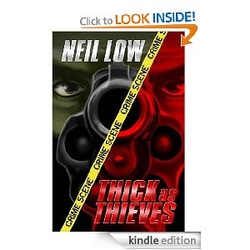
For the next four weeks I'm off on a fabulous trip to Australia. During that period, I'll be looking in from time to time with things that catch my attention and which I think you as readers and writers would like to know about. It struck me recently that as writers we often feature other writers on our blogs and websites but we rarely touch on how the 'writing of a novel' actually comes about. So I thought I'd feature writers and get them to tell us how the germ of an idea for their novel came to them and how they set to and wrote that book. First writer I'm delighted to have on my website is Neil Low - over to you Neil!
Neil Low, police captain extraordinaire!
I am always vigilant when it comes to looking for story ideas to write about. As a veteran police captain I pay particular attention to crime news, headlines, and pick through cold cases. I look for the unusual that has a particular angle worth exploring. My genre is noir fiction, set in 1940’s Seattle, when the city was rife with corruption. My protagonist is Alan Stewart, who becomes a private detective while in pursuit of the men who killed his father. All indications are the perpetrators were corrupt police officers. Because of Alan's age, he is far from "hard boiled,” in the Dashiell Hammett/Raymond Chandler sense of private investigators. Alan’s on his way to toughness, under the guidance of mentors, including Vera Deward, who becomes his partner.
The idea for the story came while I was writing the back story for another novel, a project I've since shelved until the Alan Stewart series is exhausted. I started by creating very clever characters who hijacked the story line, taking it in a direction I hadn’t foreseen. I had no outline, no plot, no idea where I was going, but I was smart enough to recognize a good story unfolding and went with it. Not until after I was published did I discover why I wrote it. A reporter asked, "Was THICK AS THIEVES your way of dealing with the death of your father?" My jaw dropped as I stared a long moment... "Yes, absolutely." She had figured it out before I did. My first story was a form of catharsis, and I felt much better for getting it out of me and down on paper.
My second novel's theme was based on spying and concerns over US scrap metal going to Japan, prior to US entering the war. I wondered if this scrap metal had helped build the ships responsible for my father's ship being sunk near Guadalcanal. I tied my curiosity to an internet story I found on women spies, some based on the West Coast. I wondered what motivated them. So I read heroic accounts of them sacrificing their lives for their countries, a theme I felt compelling. An added bonus I didn’t discover until SIGN OF THE DRAGON neared completion was that two Canadian’s had tried to blow up the ship I had picked for my story in Seattle’s harbor. So I figure a certain amount of kismet played a role in this story’s creation.
With all four of my novels, I have worked with little in the way of plotting, but that’s not a completely true statement. I had been a detective, a detective sergeant, and a police manager for years. I know what it takes to solve a case: the same elements it takes to tell a good story. The boilerplate is engrained in my head. So although I will tell you I write organically and not rely on a plot, the truth is that the plot is not very far below the surface of my psyche.
Apologies Neil as at first I had you down on here as an ex police Captain!



 RSS Feed
RSS Feed
